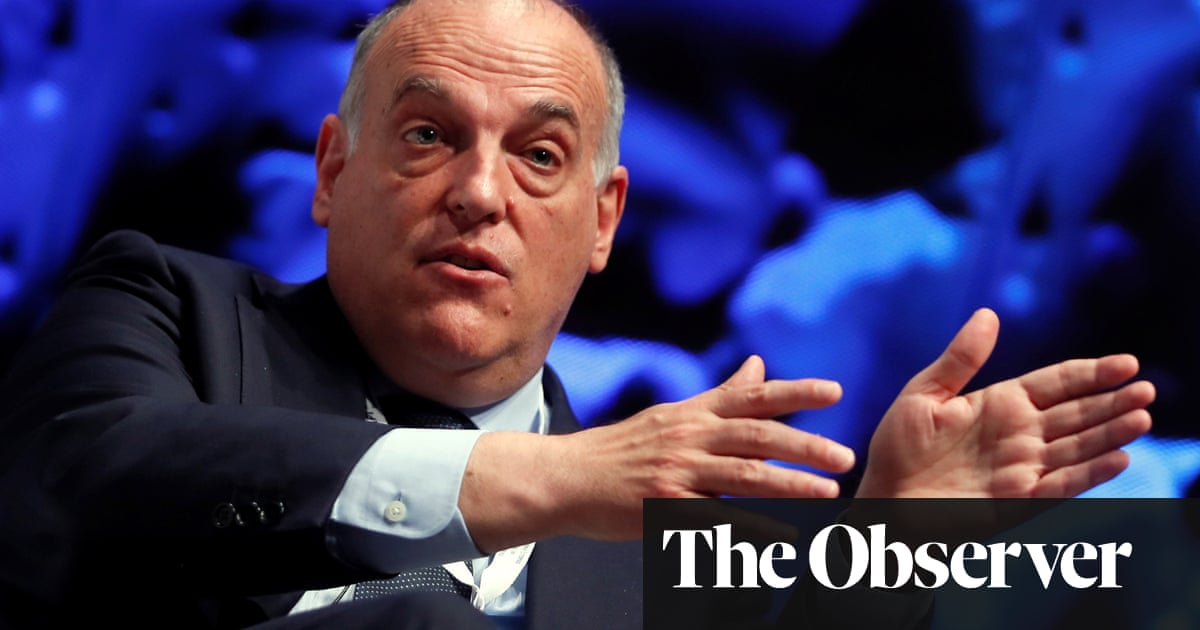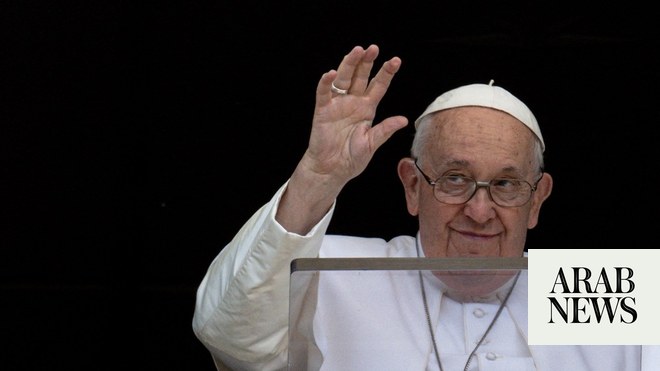
“When we go for a coffee afterwards, most people agree with me.” Javier Tebas is reflecting on why, in the polarised world of European football, it sometimes feels he is the only major player speaking out against the sport’s direction.
The La Liga president’s job title renders him inescapably part of the establishment: for almost 11 years he has overseen the second-richest league in the world. But few executives at his level are as prepared to upset the apple cart, to vehemently question the growing imbalances that risk distancing top-level football from all bar an elite few.
“I’m not afraid to say things,” he says, sitting in the London office his organisation has run since 2020. “Other people find it difficult to get out of their comfort zones. They say they are being prudent, but being prudent can lead to cowardice and imprudence for not defending the things you need to defend.”
Attack has often been the best form of defence for Tebas. He has consistently scorned the Super League project, which gratefully gulped up the oxygen offered by last month’s European court of justice ruling that Uefa’s framework for prior approval of competitions was inadequate.
All sides claimed some measure of victory: in practice the outcome was more of a stalemate and did nothing, he says, to expedite the revival of a discredited scheme. “The Super League format has a very small possibility of being accepted by clubs: in other words, none.”
He compares the 64-team system put forward by A22, the company managing the concept, to a proposed Champions League pyramid that was outlined by the former European Club Association president Andrea Agnelli in 2019. That plan for a largely closed-access tournament was roundly rejected at the time. “The new proposal is much worse than that one, which the majority of clubs and leagues pushed to remove,” he says. “It won’t have clubs’ support and in my opinion it would be very difficult to approve it. The current system, for all its faults, is much better and more efficient than what the Super League is putting forward.”
The latter statement will stand up beyond this season so long as the Champions League’s new 36-team Swiss model, beginning in 2024‑25, beds in successfully. But if the Super League is a dying project, the two clubs flogging it hardest lie under his watch. Real Madrid and Barcelona have refused to let it drop and it takes little prompting for Tebas to point the finger at his arch-enemy Florentino Pérez.
His long-term conflict with Real’s president will not be resolved any time soon. They have been at odds ever since the centralising of La Liga clubs’ media rights in 2015, which sought to level Spain’s commercial playing field. The pair have not met since a dinner three years ago and Tebas has rejected overtures to reconvene. “When somebody wants to break into your house you’re not going to come to a consensus with the person that wants to rob it,” he says. “[Pérez’s] goal is that the big clubs, those who are richest and have the biggest assets, can run football in Europe,” he says. “And that the rest are just vassals, who should be happy with whatever they are given.
“The fundamental differences I have with Florentino are two models of professional football that are completely opposite, in the domestic arena as well as in Europe. There’s no compromise between them, they are black and white and there is no grey area.”
He rejects any notion the Premier League’s financial power, and its status as a de facto Super League, is an overarching reason for Pérez and his Barcelona equivalent, Joan Laporta, to break ranks. Barcelona, dicing with disaster over non-compliance with Uefa’s financial fair play rules and hamstrung domestically for similar reasons, have their own reasons to stir things up. Real posted a profit of around €12m (£10.2m) in 2022-23 and achieved a revenue of €843m (£724m), the highest in their history.
“How can they be so concerned about England if they are bringing in that much money?” Tebas says. “It’s a narrative they’ve come up with to try to justify what they’re doing.”
He is speaking in the week Everton, for the second time, and Nottingham Forest were charged with breaching the Premier League’s FFP regulations. The retrospective punishments imposed in England differ from the strict pre-emptive FFP controls implemented in Spain’s top flight. “Our system works,” he says. “What’s happening in England is what we’ve been saying at La Liga for many years. The Premier League was running at a financial loss and was unsustainable. That’s why all the sanctioning procedures are coming out now.”
Is it time for English football to take Spain’s lesson? “That’s a question you can ask Leicester City, who would have stayed up if Everton had 10 points taken away last season. It’s why you need to do these controls in real time, because it avoids those injustices. You need to win on the pitch with sporting and economic rules.”
That leads Tebas to another pet topic. He has long railed against state-backed clubs, more for their wanton spending than for their existence. In a transfer window that has been light on big spending he senses a change of attitude and potentially an FFP-induced acceptance that excesses must be reined in.
“If you look at the window so far, the Premier League clubs have spent €38m,” he says. “This time last year there were €800m spent and state-backed clubs were an important part of those operations. I don’t think they are going to repeat that this time. It shows a certain cooling-off in state-backed clubs’ operations, which has caused a domino effect.
“We’ll see if this continues but we need to be vigilant. I think it’s a consequence of the fact Uefa and the Premier League have realised the state-backed club system, or any heavily backed club constantly running at losses, is not a good model. The integrity of the competition is at risk.”
Since last April, Tebas has been heavily involved with the Union of European Clubs (UEC), which was set up to provide “non-elite” clubs across the continent with greater representation. It has been largely opaque about its membership in a climate that has seen the European Club Association (ECA), recognised by Uefa as the sole entity representing clubs’ interests, scramble to bring lower-profile outfits under its wing.
“I think the ECJ sentence in December is opening the road for UEC to be recognised by Uefa,” he says. “It’s a positive organisation, it’s not against anybody. Uefa has the possibility to recognise an association that simply looks to safeguard the wellbeing of European football. It’s a support to Uefa and absolutely against models like the Super league. It doesn’t make sense that you’d deny that. UEC is not a project against the ECA, that’s a mistake people make. They need to realise UEC is here to add to, not subtract from, the overall picture.”
Amid such projects he has not forgotten a previous pledge to take legal action that would prevent Fifa’s expanded 32-team Club World Cup from going ahead. “It’s at the top of my mind,” he says. “Look at the ECJ sentence. It was referring to the Super League but it’s completely applicable to decisions made by Fifa where the process is not correct: where what they approve is prejudicial to the ecosystem of football. That’s all I can say.”
Can he really see Gianni Infantino’s pet project falling through? “I hope so. At least I’m going to try. And not just us by the way. The players are concerned about their welfare, and this kind of competition brings money only to a series of clubs and compresses the calendar.”
At 61, his pugnacity shows no sign of abating. Back in October, addressing a UEC meeting, he cautioned that the future of European football could soon look “pretty dark”. Does he stand by that? “If we have an active posture and a correct line, the exact opposite of what the Super League strategy is showing, I don’t see it so dark. But if we stay here with our arms crossed, obviously we’re going to have real issues.” The debates over coffee may assume fresh urgency.












